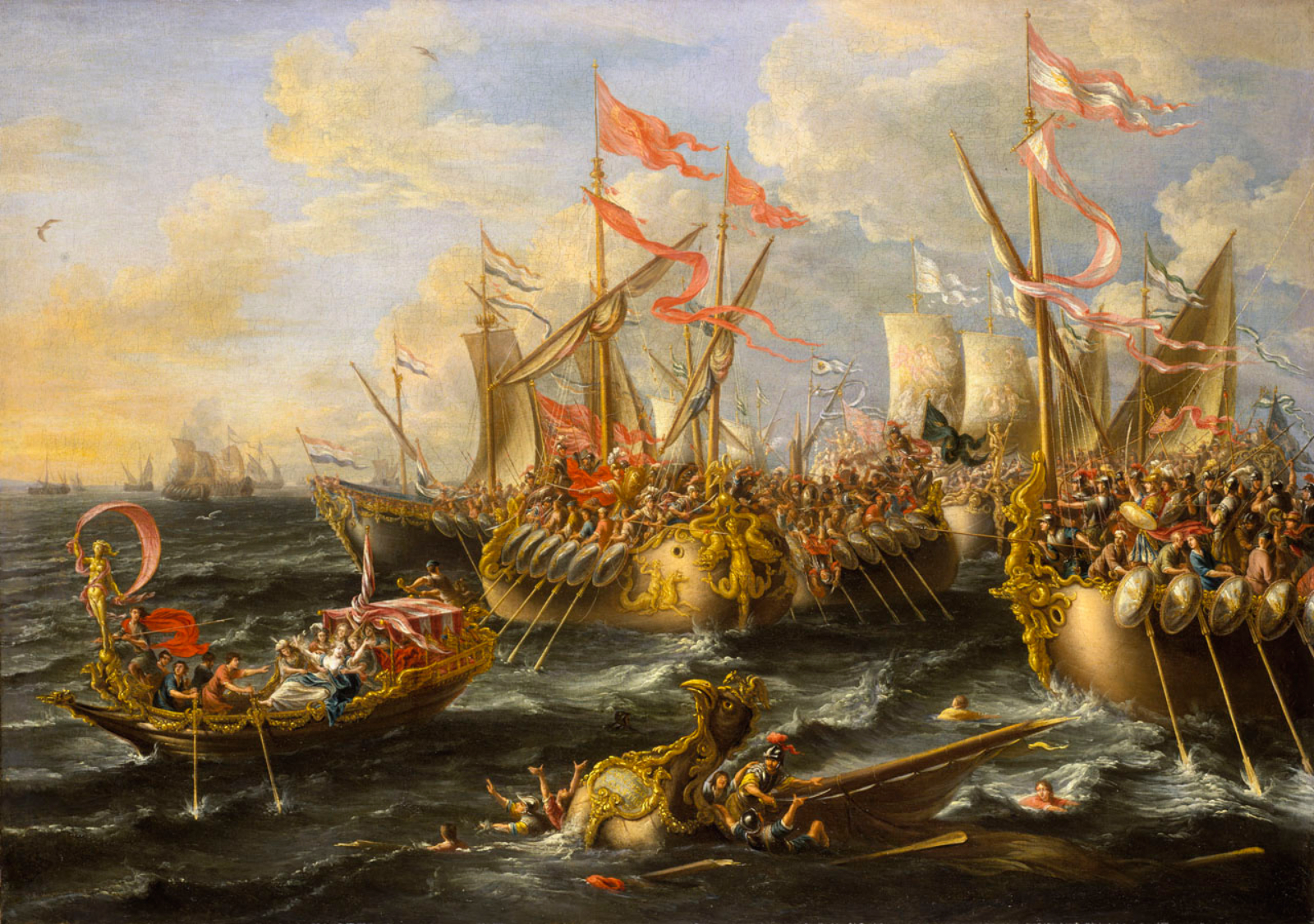
War of Actium
The War of Actium[1][2][3][4][5] (32–30 BC) was the last civil war of the Roman Republic, fought between Mark Antony (assisted by Cleopatra and by extension Ptolemaic Egypt) and Octavian. In 32 BC, Octavian convinced the Roman Senate to declare war on the Egyptian queen Cleopatra. Her lover and ally Mark Antony, who was Octavian's rival, gave his support for her cause. Forty percent of the Roman Senate, together with both consuls, left Rome to join the war on Antony's side. After a decisive victory for Octavian at the Battle of Actium, Cleopatra and Antony withdrew to Alexandria, where Octavian besieged the city until both Antony and Cleopatra were forced to commit suicide.
The war involved some of the largest Roman armies ever seen. Both Antony and Octavian's legions were experienced veterans of previous civil wars who had fought together, many also having once served under Caesar. The two did however raise their own legions separately.
Following the end of the war, Octavian brought peace to the Roman state that had been plagued by a century of civil wars, marking the beginning of the Pax Romana, a period of relative internal peace and stability. Octavian became the most powerful man in the Roman world and the Senate bestowed upon him the honorific of Augustus in 27 BC. Octavian, now Augustus, became the first Roman emperor and transformed the Republic into the Roman Empire.
Background[edit]
Mark Antony was in Egypt with Cleopatra instead of his wife, Octavia, Octavian's sister. Octavian was scheming to find a way to sever ties with Mark Antony, start a war to crush him, kill a potential rival and take control of the entire Roman world. He did this by cleverly exposing Antony's will to the Senate, where he read out how Antony had left all his money to his children by Cleopatra, where they would reign as monarchs over kingdoms that he and Cleopatra would leave to them. Romans were scandalized by this type of behavior. Then Antony divorced Octavia to marry Cleopatra.
Octavian convinced the Senate via a propaganda campaign to start a war against Cleopatra, since they were reluctant to declare war on Antony, as he was a true Roman and the last thing Octavian or the Senate needed was a mutiny. Eventually, Octavian chased Antony's senatorial supporters from Rome, and in 32 BC, the Roman Senate declared war against Cleopatra.
War[edit]
[edit]
By mid-summer of 31 BC, Antony maneuvered his army into Greece and Octavian soon followed. Octavian brought with him his chief military adviser and closest friend Marcus Vipsanius Agrippa to command his naval forces. Although the ground forces were comparable, Octavian's fleet was superior in number. Antony's fleet was made up of large vessels, but with inexperienced crews and commanders. Octavian's fleet of smaller, more maneuverable vessels was filled with experienced sailors.
Octavian moved his soldiers across the Adriatic Sea to confront Antony near Actium. Meanwhile, Agrippa disrupted Antony's supply lines with the navy. Gaius Sosius commanded a squadron in Mark Antony's fleet with which he managed to defeat the squadron of Lucius Arruntius and put it to flight, but when the latter was reinforced by Agrippa, Sosius's ally Tarcondimotus I - the king of Cilicia - was killed and Sosius himself was forced to flee.
Octavian decided not to attack and risk unnecessary losses. Instead, Octavian wanted to battle Antony by sea where his experienced sailors could dominate. In response, Antony and Octavian engaged in Fabian strategy until the time was right. As the summer ended and autumn began to set in, both Octavian and Antony settled for a battle of attrition. The strategy of delay paid dividends to Octavian, as morale sank and prominent Romans deserted Antony's cause. However, despite this Antony was still able to maintain the loyalty of his legions.
Aftermath[edit]
Within a month, Octavian was named Pharaoh, and Egypt became his personal possession. By executing Antony's supporters, Octavian finally brought a century of civil war to a close. In 27 BC Octavian was named Augustus by the Senate and given unprecedented powers. Octavian, now Augustus, transformed the Republic into the Roman Empire, ruling it as the first Roman emperor.
In the ensuing months and years, Augustus passed a series of laws that, while outwardly preserving the appearance of the Republic, made his position within it of paramount power and authority. He laid the foundations for what is now called the Roman Empire. From then on, the Roman state would be ruled by a Princeps (first citizen); in modern terms, Rome would from now on be ruled by emperors.
The Senate ostensibly still had power and authority over certain Senatorial provinces, but the critical border provinces, such as Syria, Egypt, and Gaul, requiring the greatest numbers of legions, would be directly ruled by Augustus and succeeding emperors.
With the end of the last Republican civil war, the Republic was replaced by the Empire. The reign of Augustus would usher in the golden era of Roman culture and produce a stability which Rome had not seen in over a century. With Rome in control of the entire Mediterranean world, a peace would reign in the Roman world for centuries after the death of Augustus: the so-called Pax Romana (Roman Peace).
Three of the Roman emperors in the 1st century, Caligula, Claudius, and Nero, would be direct descendants of Mark Antony.
The Empire that Augustus established would last in Western Europe until the fall of Rome in the 5th century AD. The eastern part of the Roman Empire would also survive as the Byzantine Empire until the fall of Constantinople in AD 1453.